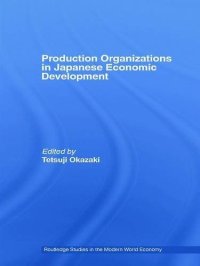
Ebook: Production Organizations in Japanese Economic Development
Author: Tetsuji Okazaki
- Tags: Economic Conditions, Economics, Business & Money, Microeconomics, Economics, Business & Money, Economics, International, Business & Money, Processes & Infrastructure, Customer Relations, E-Commerce, Facility Management, Government & Business, Green Business, Information Management, Infrastructure, Office Automation, Office Equipment & Supplies, Office Management, Operations Research, Organizational Change, Organizational Learning, Purchasing & Buying, Research & Development, Strategic Planning, Structural Adjustment, Busi
- Series: Routledge Studies in the Modern World Economy
- Year: 2007
- Publisher: Routledge
- Language: English
- pdf
In this important new book, the authors explore how production was organized in the context of the economic development of modern Japan.
Production organizations are taken to mean the long-term relationships which economic agents create for production, based on employment contracts or long-term transactions. This includes hierarchical organizations such as factories and corporations, but also flexible arangements such as subcontracting.
Modern Japanese economic development is characterized by the co-evolution of these two types of production organizations, while American economic development in the modern period is characterized by the development of a mass production system based on large hierarchical organizations. The question is raised as to why and how a certain type of organization proliferated in a certain industry in a certain period, and what the role of that organization was in coordinating production and giving incentives to the economic agents involved. The result is a comparative institutional analysis of the organizational foundations of Japanese economic development in the modern period.